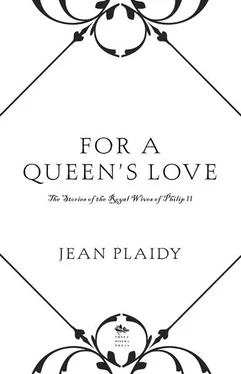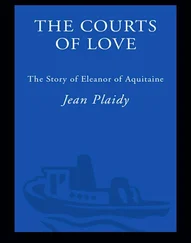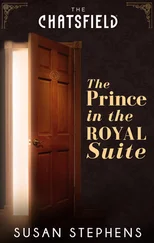Jean Plaidy - For a Queen's Love - The Stories of the Royal Wives of Philip II
Здесь есть возможность читать онлайн «Jean Plaidy - For a Queen's Love - The Stories of the Royal Wives of Philip II» весь текст электронной книги совершенно бесплатно (целиком полную версию без сокращений). В некоторых случаях можно слушать аудио, скачать через торрент в формате fb2 и присутствует краткое содержание. Жанр: Старинная литература, на русском языке. Описание произведения, (предисловие) а так же отзывы посетителей доступны на портале библиотеки ЛибКат.
- Название:For a Queen's Love: The Stories of the Royal Wives of Philip II
- Автор:
- Жанр:
- Год:неизвестен
- ISBN:нет данных
- Рейтинг книги:5 / 5. Голосов: 1
-
Избранное:Добавить в избранное
- Отзывы:
-
Ваша оценка:
- 100
- 1
- 2
- 3
- 4
- 5
For a Queen's Love: The Stories of the Royal Wives of Philip II: краткое содержание, описание и аннотация
Предлагаем к чтению аннотацию, описание, краткое содержание или предисловие (зависит от того, что написал сам автор книги «For a Queen's Love: The Stories of the Royal Wives of Philip II»). Если вы не нашли необходимую информацию о книге — напишите в комментариях, мы постараемся отыскать её.
For a Queen's Love: The Stories of the Royal Wives of Philip II — читать онлайн бесплатно полную книгу (весь текст) целиком
Ниже представлен текст книги, разбитый по страницам. Система сохранения места последней прочитанной страницы, позволяет с удобством читать онлайн бесплатно книгу «For a Queen's Love: The Stories of the Royal Wives of Philip II», без необходимости каждый раз заново искать на чём Вы остановились. Поставьте закладку, и сможете в любой момент перейти на страницу, на которой закончили чтение.
Интервал:
Закладка:
But carnal love had become legitimate love. Love between herself and Philip must be more than pleasure; it must be duty. Without it, how could they produce the heir for which England and Spain were waiting?
So now … there need be no suppression. Now thoughts could run riot like mischievous children in hitherto forbidden gardens.
“Philip,” she murmured; and all through the night she dreamed of him.
They were married in the beautiful Cathedral of Winchester. Gardiner, with the help of three bishops, performed the ceremony; and not since the days of the Queen’s great father had such pomp been seen.
The greatest nobles of Spain and England were assembled in the Cathedral. Many of the English—chief of whom was Bishop Gardiner—were in a state of exultation, for they saw in the marriage that for which they had long prayed since King Henry broke with the Pope: the return of England to Rome.
After the ceremony had been performed, Philip and Mary, surrounded by the noblemen of both countries, went to the Bishop’s Palace, where a great feast was awaiting them.
Here dishes were served with the utmost ceremony, as though the food itself were royal. The minstrels played gay music while the guests ate; but all the Spanish guests were furious because Philip ate from a silver plate while Mary had a gold one. They realized that these people meant to show them that Mary was Queen of England, Philip but the Consort; and that England would be ruled by the English.
It was a matter over which hot-headed Spaniards would have drawn the sword had they not been warned against this by Philip himself. They must content themselves with smiling at the Queen’s loving expression when her eyes fell on Philip. Soon she would be his slave; then her parliament and her courtiers would follow.
Nor were the Spaniards allowed to serve Philip at table.
“Nay,” said the hearty English: “he is our guest. He has married our Queen and we demand the privilege of serving him.”
And what could be done? Nothing. The Spaniards could only marvel at these people, at their crudeness, their huge appetites, and their ability to sweep aside etiquette and make the rules which best suited themselves. Spanish discipline was needed here, thought the guests. Let them wait until Philip’s son was born! Let them wait until the Holy Inquisition was set up in this land!
The Queen gave the toast of her guests, and this she drank from a golden cup. Then she drank the health of her husband, whose titles were proclaimed by a handsome herald. “King of England, Naples, and Jerusalem, Prince of Spain, and Count of Flanders.”
And every eye of every Spaniard gleamed with loving devotion.
To Philip it seemed that the celebrations would never end, yet he dreaded their climax. Mary was growing fonder of him with every passing moment. What tenderness had she known in her life? Very little. And when this young man—one day to be the greatest monarch in the world—showed her kindness, it was almost more than she could bear. All her feelings, so carefully suppressed, were about to burst forth like a river in flood; she was longing for the consummation of her marriage. This Philip had everything to offer her; youth, quiet dignity—which penetrated his new aspect of bonhomie —tenderness, kindliness, and understanding. Mary was happier at her wedding feast than she had ever before been in the whole of her life. There was one thing she regretted besides her lost youth—that her mother could not see her now. How happy Katharine of Aragon would have been to see her daughter, Queen of England, married to her kinsman, that together they might rule the world while they led it to the only true faith.
After the banquets the great ball began. To the Spaniards and the English this was a further cause for dissension. For could Spaniards dance the crude English dances? It seemed to them that the English had no notion of grace; they pranced, leaped, and laughed as they danced, as though a dance were an expression of joy rather than of grace. They laughingly declared—in their barbaric tongue, which only a few of their guests could understand—that if the Spanish dances were danced they would all die of laughing, for such laughter as they would be unable to suppress would result in death after such a surfeit of beef, mutton, and roast peacock. As for the grandees, the hidalgos , and the stately dons, how could they so fling their arms about? How could they leap into the air, guffawing as they did so?
Only the King and the Queen seemed to find the contrast between Spanish and English customs amusing. Philip, charming and courtly, discovered that the English knew the German style of dancing, which was not quite so crude as the English and was known to the Spaniards. So, in German fashion, they danced, led by the short, trim Philip in his dazzling wedding garments, hand-in-hand with the Queen, who was made almost handsome by the glitter of jewels and the shine of happiness.
Had that been all that was demanded of him, Philip would have felt great relief. But now the night was upon them. He and his Queen had been disrobed; their attendants had retired, and all but a few candles doused.
She was waiting for him—her eyes ardent, her thin arms eager. She was frightened yet desirous, seeing in him the embodiment of a dream. He was the belated lover; he was the savior who would help her to lead her country back to Holy Church.
And he? He was smiling; she did not notice that the smile was fixed on his lips to make of him an eager lover, as a crown, set on Mary’s head, had made her a Queen. He was seeking to sharpen his pity for her into some semblance of desire.
She, so thin, so tense, so trembling, shocked him. How could he make love to her? He thought of Maria Manoela, the bride of his youth; he thought of Isabel, Catherine, and his Flemish mistress. He longed for them—any of them—anyone but Mary Tudor.
Fervently he beseeched the saints, and the saints, it seemed to him, came to his aid. He thought of his father’s words; of the cheers of the people which had never failed to greet him; momentarily he thought of the misshapen body of Don Carlos. With his life Philip wished to serve Spain and the Holy Inquisition. He felt single-minded in his devotion to them. He was ready to serve Spain and the Holy Inquisition in the arms of Mary Tudor.
THREE
A slight mist hung over the great chamber in the Palace of Whitehall. It was the month of November, the most significant day, said all Spaniards and some Englishmen, in England’s history. That morning, Philip, making his way to hear Mass in Westminster Abbey, had been accompanied by English, Spanish, and German guards, all clad in dazzling uniforms. The people in the streets had gathered to watch them—some with approval, some with lowering glances. “This is the return to God,” said some.
Others muttered: “Now we shall see terrible sights. Now we shall have the Inquisition in our land. That is why they made the Spanish marriage; this is the darkest day in English history.”
Thus the people were divided.
During the last four months there had been numerous affrays between Englishmen and Spaniards; many a Spaniard making his way through a lonely place was set upon and robbed. He might call for help, but no Englishman would succor him.
“Get back to your own country!” children shouted after the foreigners.
“These are the worst people in the world!” wailed the Spaniards. “This is the least Christian nation. The English make no attempt to understand our language. They are barbarians.”
Barbarians they might be, but the Spaniards knew them to be no fools. They managed to get their own way and they would not crown Philip King. They insisted on treating him as Consort only, and, although the Queen loved him to such an extent that she would grow hysterical when he was absent, it was still the English who were ruling England.
Читать дальшеИнтервал:
Закладка:
Похожие книги на «For a Queen's Love: The Stories of the Royal Wives of Philip II»
Представляем Вашему вниманию похожие книги на «For a Queen's Love: The Stories of the Royal Wives of Philip II» списком для выбора. Мы отобрали схожую по названию и смыслу литературу в надежде предоставить читателям больше вариантов отыскать новые, интересные, ещё непрочитанные произведения.
Обсуждение, отзывы о книге «For a Queen's Love: The Stories of the Royal Wives of Philip II» и просто собственные мнения читателей. Оставьте ваши комментарии, напишите, что Вы думаете о произведении, его смысле или главных героях. Укажите что конкретно понравилось, а что нет, и почему Вы так считаете.












